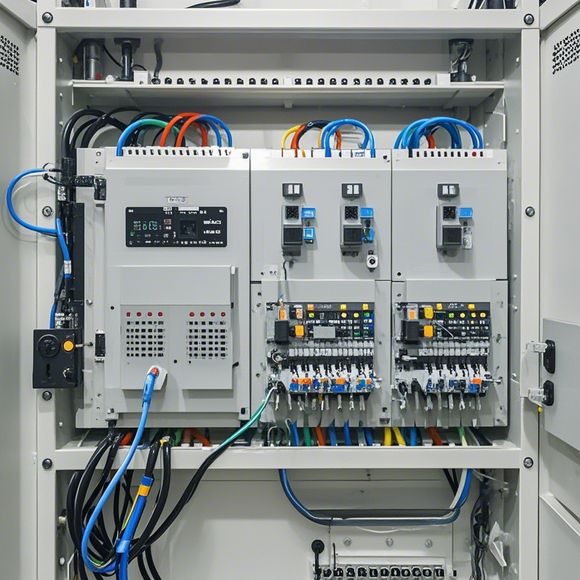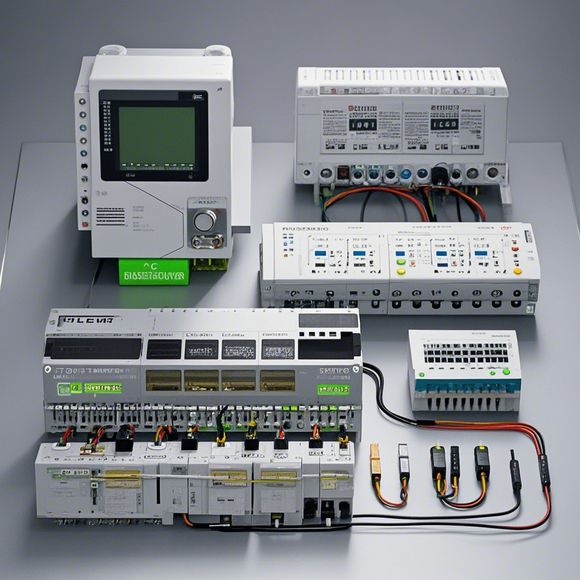Introduction to PlC (Programmable Logic Controllers) in China
In China, the field of Programmable Logic Controllers (PLC) has seen significant growth in recent years. These versatile devices are widely used for industrial automation applications, such as process control, machine monitoring, and production line management. With their ability to handle complex tasks and adapt to changing conditions, PLCs have become an essential element in modern manufacturing operations. In this article, we will discuss some of the key features and benefits of using PLCs in China, as well as some of the challenges that may need addressing when implementing these systems.
In today's world, the importance of industrial automation cannot be overstated. One of the key components of this automation is the Programmable Logic Controller (PLC), a device that enables precise control and monitoring of industrial processes. The plc market in China is growing rapidly due to the country's rapid industrialization and increasing demand for high-quality automation solutions. In this guide, we will explore the various aspects of using PLC controllers in China, from their design and functionality to their applications in different industries.
1、Design and Functionality

A PLC is essentially an electrical device designed to perform a specific task based on input signals received from sensors, switches, or other input devices. It can store data, execute algorithms, and communicate with other devices through a network interface. PLCs are available in different sizes and configurations depending on the complexity of the system they are designed to control. They come in both analog and digital versions and offer a wide range of features such as programmability, fault tolerance, and connectivity options.
2、Applications in China
The plc market in China is diverse and covers a wide range of industries. Some of the most popular applications of PLCs include:
a. Automation in Manufacturing: PLCs are used extensively in manufacturing industries to automate production lines, process control, quality inspection, and inventory management. For example, in the food industry, PLCs are used to monitor temperature and humidity levels in storage areas to ensure product freshness and quality.
b. Industrial Automation: PLCs are also used in industries such as mining, oil & gas, chemicals, and construction. In these industries, PLCs are crucial for controlling machinery and equipment, monitoring environmental conditions, and ensuring safe operations.
c. Consumer Goods: PLCs are also used in consumer goods industries such as electronics, appliance manufacturing, and pharmaceuticals. In these industries, PLCs are used to control lighting systems, power supply systems, and temperature control systems.
d. Energy Generation: PLCs are widely used in the energy generation sector, particularly in the power generation industry. PLCs are used to control power plants, substations, and transmission lines, ensuring safe and efficient operation of power systems.
e. Healthcare: PLCs are increasingly being used in healthcare facilities to control medical equipment and monitor patient conditions. For example, they are used in hospitals to control oxygen supply systems, monitor patient vital signs, and manage inventory levels.
3、Connectivity Options
PLCs offer several connectivity options, including Ethernet, Profibus, and HART protocols. These connectivity options enable PLCs to communicate with other devices in different industrial environments. For example, Ethernet connectivity allows PLCs to connect to local area networks, while Profibus connectivity provides high-speed communication for large industrial systems. HART protocol is commonly used in chemical industry for communication between PLCs and sensors.

4、Maintenance and Support
Maintaining and supporting PLCs requires specialized skills and expertise. In China, there are many companies specializing in PLC maintenance and support services. These companies provide comprehensive solutions for PLC installation, programming, testing, and repair services. Additionally, there are online resources and forums where professionals can share knowledge, troubleshoot problems, and discuss latest trends in the field.
5、Future Development
As the plc technology advances in China, new features and capabilities are being introduced. For example, IoT integration capabilities have been incorporated into many PLCs, allowing them to communicate with smart devices and sensors in real-time. Other emerging technologies such as cloud computing and machine learning are also being integrated with PLCs, enabling them to perform complex tasks and provide predictive analytics.
6、Cost Considerations
When considering PLCs in China, it is important to consider cost factors such as purchase price, installation fees, maintenance costs, and training requirements. While PLCs may initially seem expensive, they can significantly reduce operational costs by providing accurate control and monitoring of industrial processes. Additionally, PLC vendors often offer warranties and maintenance agreements that can help offset the initial investment.
In conclusion, PLC controllers play a crucial role in the automation of industrial processes in China. From their diverse applications to their connectivity options, PLCs offer a flexible and efficient solution for many industries. By understanding their design and functionality, as well as their applications and future developments, businesses can make informed decisions about investing in PLCs and maximizing their benefits.
Content expansion reading:
Content:
Hey there! Today, I'm excited to talk about a topic that's near and dear to my heart – the rise of Chinese-made PLC controllers in the global market. Now, I know what you might be thinking – isn't this just another story about the manufacturing powerhouse that is China? Well, let me tell you, it's so much more than that.

PLC controllers, or Programmable Logic Controllers, are the brains of many industrial operations. They're responsible for controlling and automating a wide range of processes, from simple on/off functions to complex manufacturing sequences. And in recent years, Chinese manufacturers have been stepping up their game, offering high-quality PLC controllers that are not only reliable but also incredibly cost-effective.
So, what's the big deal about these Chinese-made PLCs? Well, for starters, they offer a compelling blend of features and performance that's hard to ignore. Many of these controllers come equipped with advanced technology, including touchscreen interfaces, built-in networking capabilities, and robust programming options. Plus, they're designed to be user-friendly, which means you don't need to be a tech wizard to operate them.
But it's not just about the bells and whistles. Chinese PLCs are also known for their durability and longevity. They're built to withstand harsh industrial environments, and many come with impressive warranties that give you peace of mind. And let's not forget the price point – these controllers are often significantly more affordable than their Western counterparts, without sacrificing on quality.
Now, I know some of you might be skeptical. After all, when you're dealing with complex machinery, reliability is key. But here's the thing – Chinese manufacturers have been investing heavily in research and development, and they're constantly improving their products. In fact, many of them have established partnerships with international companies to ensure they meet global standards.
Moreover, the support and service for these PLCs are getting better all the time. Many Chinese companies offer excellent after-sales service, including technical support, maintenance, and even training programs to help you get the most out of your controller. And with the increasing global presence of Chinese brands, finding spare parts or assistance is becoming easier than ever.
So, if you're in the market for a PLC controller and you're considering a Chinese option, I say go for it. Do your research, compare features and prices, and you might just be surprised by what you find. The world of manufacturing is changing, and China is at the forefront of this change. It's time to embrace the innovation and quality that these controllers have to offer. Your bottom line and your productivity will thank you!
Remember, when it comes to PLC controllers, it's not just about the brand name – it's about finding the best solution for your needs. And with the impressive capabilities and competitive pricing of Chinese-made PLCs, they're definitely worth considering. So go ahead, take the leap, and experience the advantages of Chinese manufacturing for yourself. Your business will be better off for it!
Articles related to the knowledge points of this article:
PLC Controller Wiring Guideline
PLC Programming for Automation Control in the Manufacturing Industry
How to Use a PLC Controller for Your Business
PLC (Programmable Logic Controller) Control System Basics
The Role of Programmable Logic Controllers (PLCs) in Foreign Trade Operations